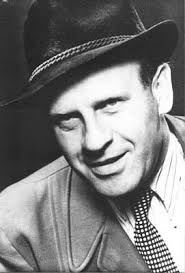 Oskar Schindler in Argentina on August 01, 1993Rafael Wollmann/Gamma-Rapho“Whoever saves one life saves the world entire” (The Talmud). Saving the world: an epically monumental achievement. A deed held solely by the most powerful and popular of our comic book heroes. Only of the constructs of society’s imagination do such kinds of undertakings occur, unrealistic achievements simply being creations of the mind, fantasies drawn up from people’s hope that one day, everyone can themselves be superheroes and carry such a grand heroic accomplishment on their shoulders. However, these “unrealistic achievements” are attainable by anyone, not just the characters who reside in an otherworldly realm. Society does not need to look to the horizon with a shared dream of one day housing ultimate heroes, but instead look in its past, to all the times that the hope in humanity had been all but lost, and someone determinedly rose from the ashes of despair, putting a selfless foot forward in the name of others. When people cried out for help and someone came to answer, undergoing a life-changing epiphany in order for them to see further beyond themselves and be able to put everything on the line, saving those people with no stray in their persistence to act on their altruistic views, never seeing a cap on the multitudes of “worlds” they can save. With this in mind, I believe that a hero is someone who changes themselves for the betterment of society at their own risk, is determined to persist in doing so and is a role model for everyone everywhere. I feel that a hero should not see a heroic action as a single great accomplishment, but as the beginning of a multitude of great things the person can continue to do. They should be intent on doing whatever they can for whomever they can, always making that extra effort for whatever the cause may be, whether it is to save a thousand lives or just one. I also believe that, as long as they transform themselves to become the best they can be, a hero can come from anywhere, whether starting out as the darkest villain or as the humblest caregiver. As a society, we should encourage the definition of a hero to not be a one-time achievement, a rare occurrence, or a permanent stamp for one single event, but instead a constant and consistent exertion of good done for others’ benefit. Upholding this belief, the hero remains an example to always look up to, whether it be the toughest time or not, a great template to keep us on the right path. They do this because they represent our society, who we are, and what we strive to be. They allow us to see that our greatest potential is reachable and that we can be just as much the hero as they were. A hero is someone who will transform themself into someone who will selflessly make a difference in their community and persistently power on with these ideals, never stopping in the name of their own health, and only thinking and acting for the well-being of anyone who could possibly need saving.
Oskar Schindler in Argentina on August 01, 1993Rafael Wollmann/Gamma-Rapho“Whoever saves one life saves the world entire” (The Talmud). Saving the world: an epically monumental achievement. A deed held solely by the most powerful and popular of our comic book heroes. Only of the constructs of society’s imagination do such kinds of undertakings occur, unrealistic achievements simply being creations of the mind, fantasies drawn up from people’s hope that one day, everyone can themselves be superheroes and carry such a grand heroic accomplishment on their shoulders. However, these “unrealistic achievements” are attainable by anyone, not just the characters who reside in an otherworldly realm. Society does not need to look to the horizon with a shared dream of one day housing ultimate heroes, but instead look in its past, to all the times that the hope in humanity had been all but lost, and someone determinedly rose from the ashes of despair, putting a selfless foot forward in the name of others. When people cried out for help and someone came to answer, undergoing a life-changing epiphany in order for them to see further beyond themselves and be able to put everything on the line, saving those people with no stray in their persistence to act on their altruistic views, never seeing a cap on the multitudes of “worlds” they can save. With this in mind, I believe that a hero is someone who changes themselves for the betterment of society at their own risk, is determined to persist in doing so and is a role model for everyone everywhere. I feel that a hero should not see a heroic action as a single great accomplishment, but as the beginning of a multitude of great things the person can continue to do. They should be intent on doing whatever they can for whomever they can, always making that extra effort for whatever the cause may be, whether it is to save a thousand lives or just one. I also believe that, as long as they transform themselves to become the best they can be, a hero can come from anywhere, whether starting out as the darkest villain or as the humblest caregiver. As a society, we should encourage the definition of a hero to not be a one-time achievement, a rare occurrence, or a permanent stamp for one single event, but instead a constant and consistent exertion of good done for others’ benefit. Upholding this belief, the hero remains an example to always look up to, whether it be the toughest time or not, a great template to keep us on the right path. They do this because they represent our society, who we are, and what we strive to be. They allow us to see that our greatest potential is reachable and that we can be just as much the hero as they were. A hero is someone who will transform themself into someone who will selflessly make a difference in their community and persistently power on with these ideals, never stopping in the name of their own health, and only thinking and acting for the well-being of anyone who could possibly need saving.
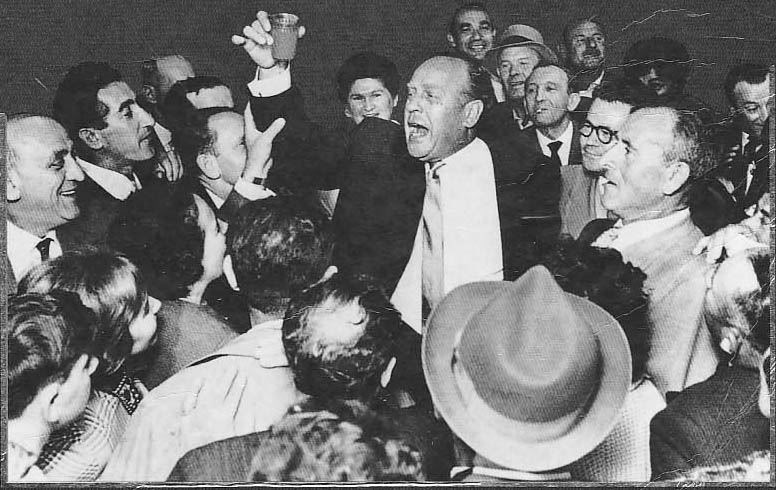 Schindler at Nazi Party, MiddlePinsdaddyOskar Schindler may not have started out as someone heroic or even someone righteous enough to look up to, but with determination and selflessness, he was able to mold himself into the most exemplary hero. Throughout his later life, he can be seen as heroic, everything he did focused on helping someone other than himself in some way. Although, this change did not just come to him. It took time and great realization for him to eventually reach his true potential, and then reach even further than that. Born April 28, 1908, in Zwittau, Austria-Hungary, from a wealthy Catholic family, Oskar Schindler grew up privileged and respected. As he matured, Schindler became more and more focused on himself, while his narcissism and constant greed blinded him from the world around him and blurred the line between good and evil, which caused a great indifference to morals and values within him. This indifference allowed corruption to take root, which led Schindler to eventually become a German Industrialist and a war profiteer, seizing the devious opportunity before him. He traveled over to Krakow in October 1939, what used to be occupied by Germany, to start his own ammunition and enamelware factories with the cheapest labor around: Jewish. He hired a Jewish accountant to help maintain his business, being new to this line of work. Behind his back, his accountant, Itzhak Stern, brought many helpless and endangered Jews into the factories for protection, passing them off as “essential to the war effort.” Schindler started receiving gratitude from the many prisoners working in his plants, but took it with bitterness and didn’t accept the appreciation, still being the cold-hearted man he was. He could not understand why people saw his land as “an oasis,” but slowly started to realize why. This epiphany came on a day like any other, when he was looking upon the Nazi’s chaotic struggle to forcefully withdraw the Jews from their homes and into the roads, and noticed a small girl in a red coat, shuffling obliviously from street to street, amid the havoc. This little girl was the absolute symbol of the Jew’s innocence, finally allowing Schindler to see clearly, even if for just a moment. When he later found her body in a heap of casualties, it was, as accounted by the Jews surrounding him, the final hit to his gut, the eye-opening moment that altered his life forever. From that time on, the more evil he witnessed, the more and more he became invested in saving as many Jews as possible. In October 1944, he ended up spending his fortune on a list of names featuring over a thousand lives that he would liberate from the malevolent world of the Nazis. Although he seemed to be an egotistical war profiteer, Schindler turned out an unlikely hero, who transformed himself into a selfless man who would not only spend the whole of his fortune but also risk his life to save over a thousand Jews, would tenaciously care for those he rescued, and would become an excellent model for all of society today.
Schindler at Nazi Party, MiddlePinsdaddyOskar Schindler may not have started out as someone heroic or even someone righteous enough to look up to, but with determination and selflessness, he was able to mold himself into the most exemplary hero. Throughout his later life, he can be seen as heroic, everything he did focused on helping someone other than himself in some way. Although, this change did not just come to him. It took time and great realization for him to eventually reach his true potential, and then reach even further than that. Born April 28, 1908, in Zwittau, Austria-Hungary, from a wealthy Catholic family, Oskar Schindler grew up privileged and respected. As he matured, Schindler became more and more focused on himself, while his narcissism and constant greed blinded him from the world around him and blurred the line between good and evil, which caused a great indifference to morals and values within him. This indifference allowed corruption to take root, which led Schindler to eventually become a German Industrialist and a war profiteer, seizing the devious opportunity before him. He traveled over to Krakow in October 1939, what used to be occupied by Germany, to start his own ammunition and enamelware factories with the cheapest labor around: Jewish. He hired a Jewish accountant to help maintain his business, being new to this line of work. Behind his back, his accountant, Itzhak Stern, brought many helpless and endangered Jews into the factories for protection, passing them off as “essential to the war effort.” Schindler started receiving gratitude from the many prisoners working in his plants, but took it with bitterness and didn’t accept the appreciation, still being the cold-hearted man he was. He could not understand why people saw his land as “an oasis,” but slowly started to realize why. This epiphany came on a day like any other, when he was looking upon the Nazi’s chaotic struggle to forcefully withdraw the Jews from their homes and into the roads, and noticed a small girl in a red coat, shuffling obliviously from street to street, amid the havoc. This little girl was the absolute symbol of the Jew’s innocence, finally allowing Schindler to see clearly, even if for just a moment. When he later found her body in a heap of casualties, it was, as accounted by the Jews surrounding him, the final hit to his gut, the eye-opening moment that altered his life forever. From that time on, the more evil he witnessed, the more and more he became invested in saving as many Jews as possible. In October 1944, he ended up spending his fortune on a list of names featuring over a thousand lives that he would liberate from the malevolent world of the Nazis. Although he seemed to be an egotistical war profiteer, Schindler turned out an unlikely hero, who transformed himself into a selfless man who would not only spend the whole of his fortune but also risk his life to save over a thousand Jews, would tenaciously care for those he rescued, and would become an excellent model for all of society today.
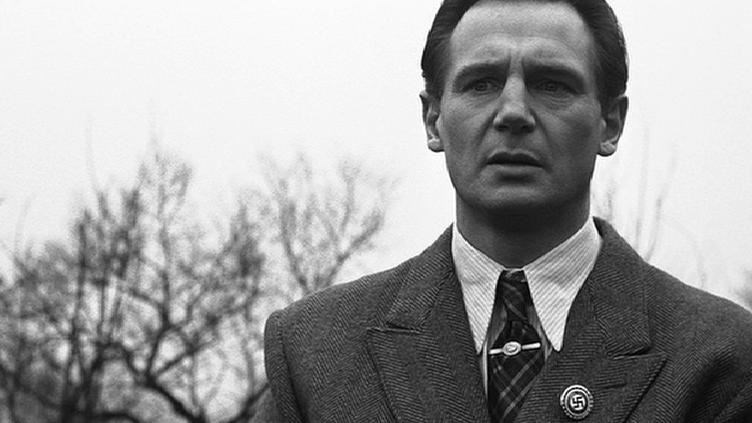 Liam Neeson as Oskar SchindlerSchindler's List, Steven SpielbergSchindler changed who he was for the benefit of those suffering around him, going from an everyday money hungry and power-driven Nazi to a selfless man, putting the lives of others before his own. A great example of the type of man he was before his drastic transformation can be found in Steven Spielberg’s movie “Schindler’s List”, in which Schindler is talking to his wife, Emilie, in a restaurant, inquiring:
Liam Neeson as Oskar SchindlerSchindler's List, Steven SpielbergSchindler changed who he was for the benefit of those suffering around him, going from an everyday money hungry and power-driven Nazi to a selfless man, putting the lives of others before his own. A great example of the type of man he was before his drastic transformation can be found in Steven Spielberg’s movie “Schindler’s List”, in which Schindler is talking to his wife, Emilie, in a restaurant, inquiring:
“SCHINDLER
Take a guess how many people are on my payroll.
EMILIE
Oskar.
SCHINDLER
My father, at the height of his success, had 50. I've got 350. Three hundred and fifty workers on the factory floor, with one purpose.
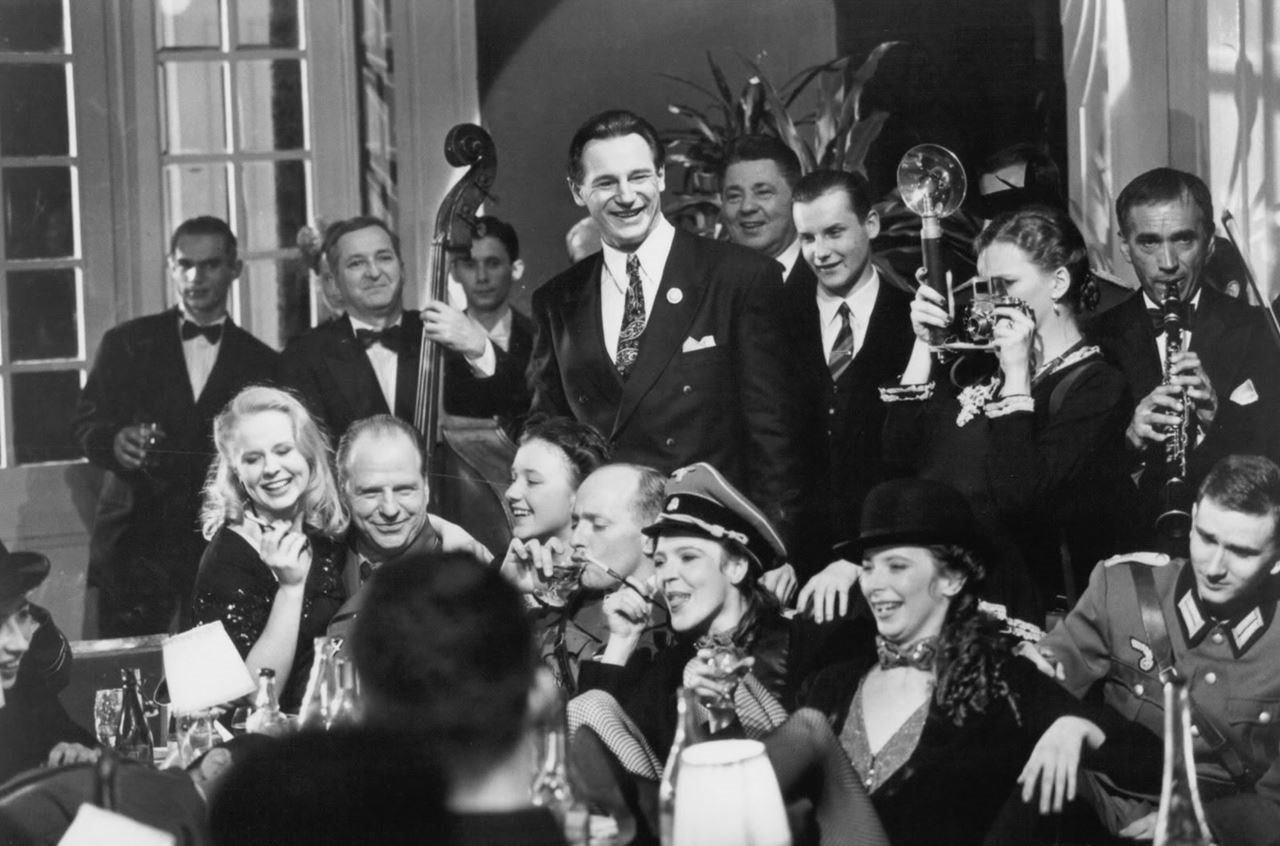 Liam Neeson as Oskar Schindler at Nazi Party, MiddleSchindler's List, Steven SpielbergEMILIE
Liam Neeson as Oskar Schindler at Nazi Party, MiddleSchindler's List, Steven SpielbergEMILIE
To make pots and pans?
SCHINDLER
To make money. For me. Does anyone ask about me?
EMILIE
Back home? Everybody. All the time.
SCHINDLER
Hmm. They won't soon forget the name Schindler here, I can tell you that. ‘Oskar Schindler,’ they'll say. ‘Everybody remembers him. He did something extraordinary’... There's no way I could have known this before, but there was always something missing. In every business I tried, I see now it wasn't me that was failing, it was this thing, this missing thing. Even if I'd known what it was, there's nothing I could have done about it, because you can't create this sort of thing. And it makes all the difference in the world between success and failure. He waits for her to guess what the thing is. His look says, It's so simple, how can you not know?
EMILIE
Luck.
SCHINDLER
War” (0:35:45 - 0:38:07).
Schindler, never being faithful to his marriage and constantly womanizing, was unable to keep a good relationship with his wife. She seldom visited, but when she did, she always was trying to give him a second chance. Yet, all the times she came close to believing in him again, such as this instance, his self-absorption took over and pushed her away. Even in a simple conversation with his own wife, Schindler could not resist gloating over his accomplishments and then even asked if people were curious about him. Here, he communicated his large ego and narcissistic thoughts, ones full of how he’d continue to become famous and make money. He was only caring for himself and had not even considered his wife in this discussion since he only wanted to talk about himself and his future. An example of Oskar Schindler after his transformation was just after World War II had mostly ended. This was also featured in Spielberg’s movie “Schindler’s List” when Schindler gathered all of the Jews he had rescued and:
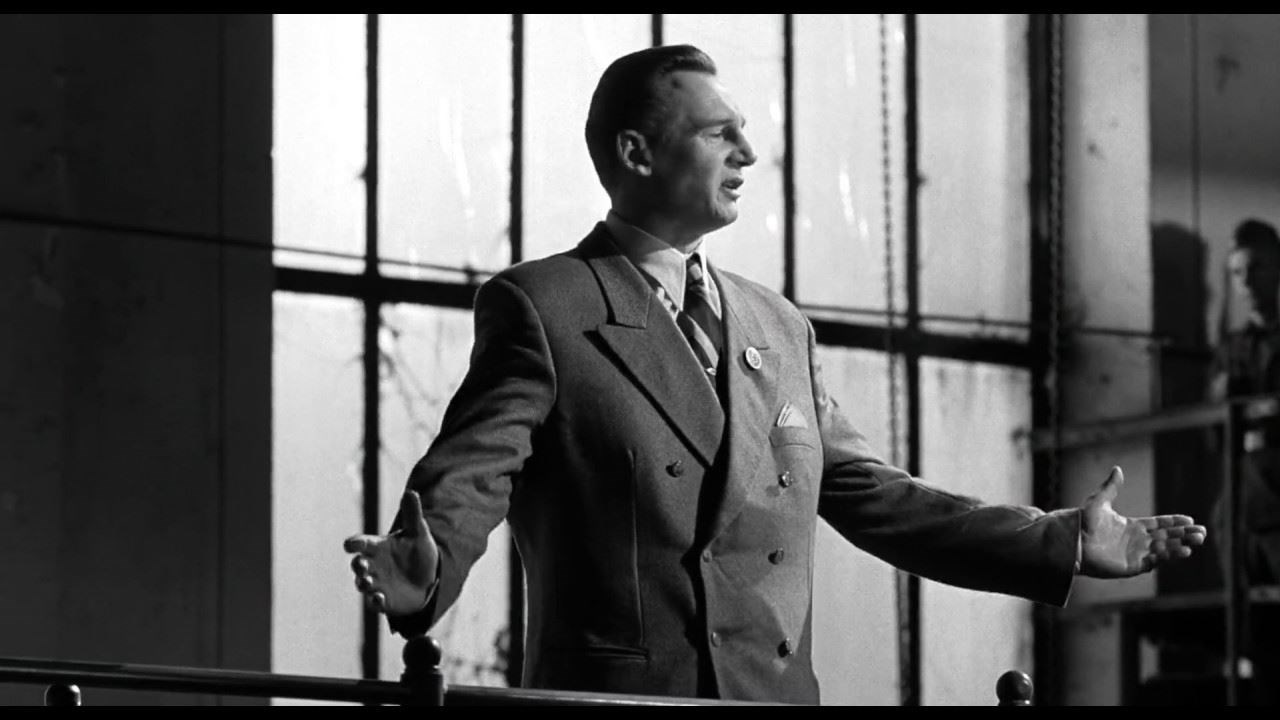 Liam Neeson as Oskar Schindler making speech to JewsSchindler's List, Steven Spielberg“Schindler turns his attention back to the workers, and, not at all like a confession, but rather like simple statements of fact: I'm a member of the Nazi party. I'm a munitions manufacturer. I'm a profiteer of slave labor, I'm a criminal. At midnight, you will be free and I will be hunted. I'll remain with you until five minutes after midnight after which time, and I hope you'll forgive me, I have to flee” (2:52:39 - 2:53:10).
Liam Neeson as Oskar Schindler making speech to JewsSchindler's List, Steven Spielberg“Schindler turns his attention back to the workers, and, not at all like a confession, but rather like simple statements of fact: I'm a member of the Nazi party. I'm a munitions manufacturer. I'm a profiteer of slave labor, I'm a criminal. At midnight, you will be free and I will be hunted. I'll remain with you until five minutes after midnight after which time, and I hope you'll forgive me, I have to flee” (2:52:39 - 2:53:10).
Oskar Schindler was explaining to his “Schindlerjuden” that even after all the many righteous things he did, he would still be targeted as a criminal, and he accepted it. He knew what had to happen, and remained content with the circumstances. Schindler was satisfied knowing that all the Jews he had pulled from the depths of evil would finally be safe, not even needing his own reassurance of safety. He no longer cared for himself, but only for the well-being of others, and with this, he was able to keep hope in humanity during such a corrupted time. Doing so, he embodied the needs of every society, whereas without selflessness would be driven to malevolence, exhibiting how he truly was a hero. This is as only a hero could completely and utterly give away all of who they were and all they had for the greater good, and Schindler was able to go over and above this trait. With this heroism, Schindler acted as an anchor for the Jews drowning in the waves of hate, staying deeply rooted where he stood no matter the risk or cost. He knew that something was bound to happen to him eventually, whether it be during or after the war, but he continued to help the engulfed victims into the light of day, whilst remaining shrouded in darkness, each rumor or investigation threatening to end him for good. Another time in which Oskar Schindler exemplified his evolved contrast of character to his beginning self was found in the movie “Schindler’s List”, after Schindler comes back to his accountant, Stern, from making a deal with Amon Goeth for the safety of 1,300 Jewish lives. While Stern is typing out the names of every Jew they would fight to save:
“Schindler leafing through the page of names, counting them, drinking, to the sound of the typewriter. Eventually, quietly to himself --
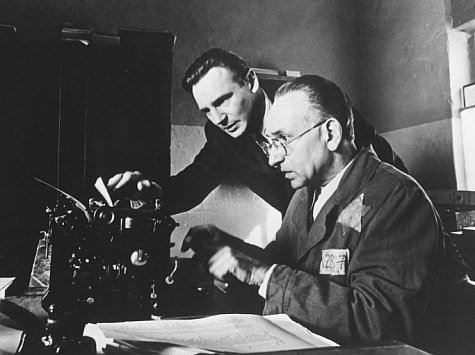 Liam Neeson as Oskar Schindler with Ben Kingsley as Itzhak SternSchindler's List, Steven SpielbergSCHINDLER
Liam Neeson as Oskar Schindler with Ben Kingsley as Itzhak SternSchindler's List, Steven SpielbergSCHINDLER
That's it. Stern heard him and stops typing, glances over.
You can finish that page.
Stern resumes where he left off, but then hesitates again.
There's something he does not understand.
STERN
What did Goethe say about this? You just told him how many you needed and-
You’re not buying them.
And Schindler does not answer. He's avoided telling Stern the details of the deal struck with Goethe, and balks telling him now.
You’re buying them? You’re paying him for each of these names?
Finally awkwardly --
SCHINDLER
If you were still working for me, I’d expect you to talk me out of it. It’s costing me a fortune” (2:23:39 - 2:24:21).
Before his transformation, Schindler was obsessed with money. He would do anything to make sure he had bounds of it at the ready, mainly the reason for his move to Krakow, Germany: to get cheaper workers, meaning Jews. Now, Schindler, just as easily, gave all that he had away, able to watch each name typed out make his wealth drop more and more. He was alright with the transaction enough that he could blatantly explain to his accountant how he had lost all he had ever built up. Oskar Schindler shows how everyone needs this level of selflessness, this ability to go all out for even just one life, since his selflessness was the only reason a handful of the Jews were able to see the end of the war in Krakow, Germany. Without his newly gained altruistic views, Krakow would have been completely overrun with pure evil. Only because of this selflessness was he able to take a step back and see the bigger picture, see more than himself, and realize how he had the power to help others. He was willing to do whatever it took to make the world even a little bit brighter. Just as a hero acts as a role-model and showcases who we, as a community, should be, Schindler is a hero, portraying the exact mindset society should strive to fit. Schindler, despite being a powerful Nazi with the choice to lead his life however he saw fit, witnessed the corruption around him and transformed from who he was to a better, selfless person, using this trait to save over a thousand Jews, all while constantly putting his fortune and life on the line.
Schindler, never thinking that enough lives saved were enough, stayed persistent at saving any and all Jews he could. He not only rescued them but looked after them, taking all responsibility for the lives of the Jewish people into his own hands. As shown in Spielberg’s masterfully directed “Schindler’s List”, once the most brutal of the war had passed and the Jews in Schindler’s care were finally guaranteed safety, Stern, his Jewish accountant, went to talk with a seemingly depressed Schindler, and he expressed:
“STERN
Thank you. It is Hebrew, from the Talmud. It says, 'Whoever saves one life, saves the world entire.'
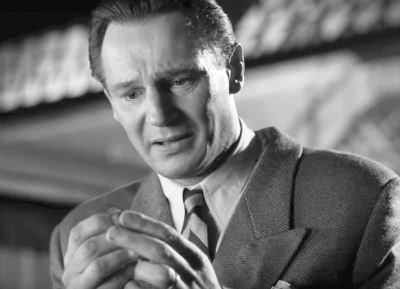 Liam Neeson as Oskar Schindler Schindler's List, Steven SpielbergSCHINDLER
Liam Neeson as Oskar Schindler Schindler's List, Steven SpielbergSCHINDLER
I could have got more out. I could have got more. I don’t know. If I just… I could have got more.
STERN
Oskar, there are 1, 100 people who are alive because of you. Look at them.
SCHINDLER
If I’d made more money. I threw away so much money. You have no idea. If I had just…
STERN
There will be generations because of what you did.
SCHINDLER
I didn’t do enough… This car. Goethe would’ve bought this car. Why did I keep the car? Ten people right there. Ten people. Ten more people. [Takes Nazi pin off vest] This pin… Two people. This is gold. Two more people. He would have given me two for it, at least one. He would have given me one, one more. One more person. A person, Stern. For this. I could have gotten one more person, and I didn’t. And I didn’t!” (2:57:27 -3:00:40).
Despite being the sole heroic savior at a time when people needed a liberator, Schindler had not felt it was enough. He wished that he could’ve saved just “one more”. Simply because he had taken responsibility for the lives of those he saved was the reason he also felt responsible for those he had not. He was so persistent that even after he led over a thousand people through the harshest of evils, he would regret not doing just a little bit more. In a truly heroic fashion, he felt guilty for not doing more, for not giving away every last penny he had, even though most people would feel excessive pride and satisfaction with such a grand level of heroism. This is why Schindler was the perfect hero. He never felt that there was a maximum amount of good, or that doing one right thing would be a great achievement, but instead thought that any good that was not done was already a loss in itself. Rather than being contempt with all the things he did do, he only focused on the things he did not, so tenacious that he could not even stop himself from thinking about any small attempt he could have made, basing himself on the quote that Stern shared with him: “Whoever saves one life, saves the world entire” but with a different view. Instead of seeing himself in the light of saving entire worlds, he saw each time that he did not make an extra effort as if he was idly letting a world be destroyed. It really is this overboard persistence that people as a whole need today so that they can always be making the best effort for themselves and their society. So that no matter what gets in their way, whether it be for saving a life or helping a friend, they can stick with it to the end, and not have to stop there. Because Schindler took this trait and pushed it to its limits, he showed how great of a hero he was. In a letter written by the Jewish population Schindler rescued, or more commonly known as “Schindlerjuden”, some of the Jewish people recounted an event expressing Schindler’s character, explaining:
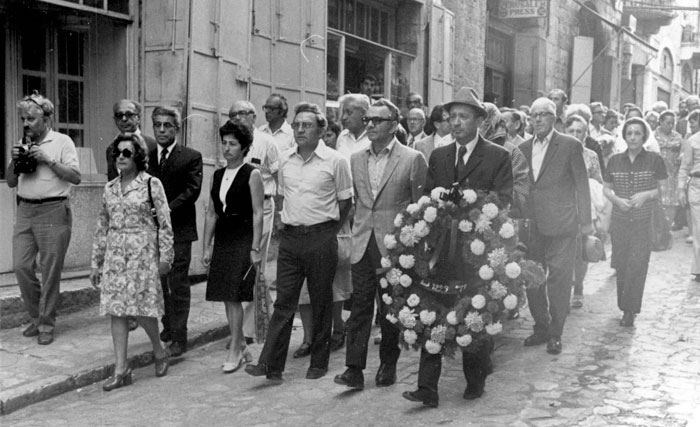 Jews saved by SchindlerChristopherMorlock“Concerning Director Schindler’s treatment of the Jews, one event that took place… was coincidentally a transport of Jewish inmates, that had been evacuated from the Auschwitz concentration camp, Goleschow outpost, and ended up near us. This transport consisted exclusively of more than 100 sick people from a hospital which had been cleared during the liquidation of the camp. These people reached us frozen and almost unable to carry on living after having wandered for weeks. No other camp was willing to accept this transport and it was Director Schindler alone who personally took care of these people, while giving them shelter on his factory premises; even though there was not the slightest chance of them ever being employed. He gave considerable sums out of his own private funds, to enable their recovery as quick as possible. He organized medical aid and established a special hospital room for those people who were bedridden. It was only because of his personal care that it was possible to save 80 of these people from their inevitable death and to restore them to life” (Schindlerjuden Letter).
Jews saved by SchindlerChristopherMorlock“Concerning Director Schindler’s treatment of the Jews, one event that took place… was coincidentally a transport of Jewish inmates, that had been evacuated from the Auschwitz concentration camp, Goleschow outpost, and ended up near us. This transport consisted exclusively of more than 100 sick people from a hospital which had been cleared during the liquidation of the camp. These people reached us frozen and almost unable to carry on living after having wandered for weeks. No other camp was willing to accept this transport and it was Director Schindler alone who personally took care of these people, while giving them shelter on his factory premises; even though there was not the slightest chance of them ever being employed. He gave considerable sums out of his own private funds, to enable their recovery as quick as possible. He organized medical aid and established a special hospital room for those people who were bedridden. It was only because of his personal care that it was possible to save 80 of these people from their inevitable death and to restore them to life” (Schindlerjuden Letter).
In the face of the inmates’ rejection by every camp and even eventual internal defeat in which they no longer believed they could “carry on living” themselves, Schindler was not able to stand by and watch them suffer. With the utmost tenacity, he did everything in his power to recover and restore these Jews to full health, using the best accommodations he could supply. He focused his effort solely on them, not thinking for anyone or anything else, until he could no longer do anything for them. Due to his need to stay with his plans until the very end, Schindler was able to become the ultimate hero, not only doing something he thought was right, but continuing with it until it reached its end, and pushing it beyond. There is a single overall main point, that when analyzing Schindler, one comes to recognize: how heroic actions should not be seen as a chore or something that is rarely done, just one effort in itself going over most people’s expectations of the good they will do in their lifetime. Instead, everyone should hope to be heroic every day, trying to help in times when it is needed and even when it may not seem needed. Schindler displays the necessity for this notion because it is only due to his tenacity that such a change was able to be made. Because Schindler was able to demonstrate this for all to take after in such an impactful way, he is a hero. With his persistence and never seeing an end to good deeds he could perform, Schindler went over and above with his heroic actions, allowing over a thousand Jews to be released from the looming threat of annihilation.
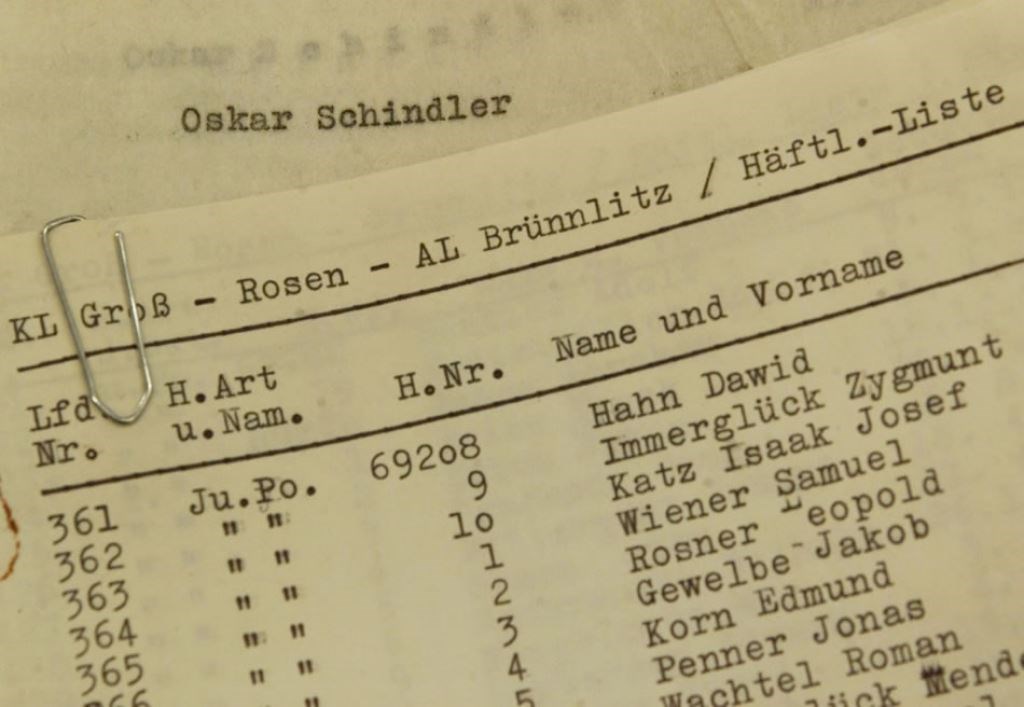 Oskar Schindler's ListThe GuardianA greatly changed man, Schindler used his unstoppable perseverance and ability to put both everything he owned and his life at stake to make himself into a great hero, one that society can model after. Schindler started out as an ordinary, let alone wealthy and power hungry, Nazi, yet was able to transform his entire outlook on life towards people other than himself after witnessing times of such evil. Along with this transformation, Schindler had become determined to save and care for any Jew he possibly could, being a role model for all in every action he performed. He would stop at nothing to do more than anyone else did at his time, and then go even further beyond that, forcing himself past the limits one is physically able to take tenacity. Ever since I was little, I remember my older family members telling stories of the Holocaust, always dripping with pain and sadness, leaving me in shocked disbelief. Being so young, I could never understand why it happened, or even more so, why no one really took a stand. Later on, when we finally watched the movie “Schindler’s List”, the different view on the story took me aback, and allowed me to comprehend the events of that time in a different light. The story of how a single man was able to make such a difference, impacting lives even to today, contrasted greatly to the depressing and sorrow-filled period that the Holocaust was. The movie helped me see the hope that existed during that time, and even made me quite interested in the story. It made me wonder what would have happened if there were no bright flames like Schindler to keep the darkness of Hitler’s plans at bay. What would have happened to the entirety of the Jewish people? Where would I be now? Only because of powerful heroes such as him were these things prevented, and thousands of people over generations were able to live and thrive. The same goes for me as well. What if one of the people he saved had been one of my relatives, and only because of him am I here today? I cannot imagine what life was like, being terrorized and slaughtered due to a simple difference in both genetics and belief. If this kind of perspective still lived to today, I know that not only my life but millions of other lives would be much different, if we even still happened to be here. In the end, whether it is chalked up to “what if” questions or not, there are multitudes of people today who can only thank Schindler for their ancestor’s survival. Schindler was one of the great forces driving the Nazi’s corrupt and malevolent plans back, and for this, I immensely appreciate Oskar Schindler for all that he did. For improving the circumstances for as many Jews as he could, and for the example he set for everyone to take after. Just as I learned to not only try to do the right thing, but also to strive to do it as often as possible for as many people as possible, anyone can tread down the path he left behind, learning how making one change in one person’s life is impacting an entire world. With all the changes happening in today’s times, people hope that they can rely on someone in their life to be able to be a real hero if needed. That they’ve done enough heroic deeds to step up to a greater level of humanity, one beyond indifference and fear, and in turn are always willing to help out whoever calls for assistance, whether it may seem minuscule or a grave issue. As a society, everyone wishes to be this way, but never truly thinks it possible, whilst it, in reality, is always within their reach. They compare such heroic things to the outrageously enormous acts that comic book heroes commit themselves to in every volume, ending world-wide issues and stopping all-mighty villains in their tracks, or even the occasional cliched “saving the world” storyline. With these thoughts blinding the truth, they never see how people throughout the history of the world have done many things representing grand scale events such as those a comic book hero fights for. With someone like Schindler, he did just that, saving entire worlds, on the basis of a quote from The Talmud, where every life saved is a world saved. With only this in mind, anyone could already see him as a great hero, saving over a thousand lives throughout his accounts in Krakow, Germany. Yet, this is where Schindler still does not stop in persisting to go past that definition of a hero and surpass extraordinary, as should everyone else, following in his footsteps. He did not acknowledge the many worlds he did rescue, but instead reflected on those he did not and took into thought all the times when he could have saved just one more life, even though the efforts he made were already so tremendous. He never saw one heroic action as enough, as neither should people today. Each and every person should be attempting to be heroic in a vast number of ways, the intensity of the action ranging from situation to situation, but no matter the differences, always exemplifying the best version of themself. Together, everyone should push forward for a time in which being heroic is no longer an impossibly high bar line, but instead is something that people work into their daily lives, finally themselves not only representing what they want society to be but becoming a precedent for the entire world to fall into step with, saving worlds upon worlds at a time.
Oskar Schindler's ListThe GuardianA greatly changed man, Schindler used his unstoppable perseverance and ability to put both everything he owned and his life at stake to make himself into a great hero, one that society can model after. Schindler started out as an ordinary, let alone wealthy and power hungry, Nazi, yet was able to transform his entire outlook on life towards people other than himself after witnessing times of such evil. Along with this transformation, Schindler had become determined to save and care for any Jew he possibly could, being a role model for all in every action he performed. He would stop at nothing to do more than anyone else did at his time, and then go even further beyond that, forcing himself past the limits one is physically able to take tenacity. Ever since I was little, I remember my older family members telling stories of the Holocaust, always dripping with pain and sadness, leaving me in shocked disbelief. Being so young, I could never understand why it happened, or even more so, why no one really took a stand. Later on, when we finally watched the movie “Schindler’s List”, the different view on the story took me aback, and allowed me to comprehend the events of that time in a different light. The story of how a single man was able to make such a difference, impacting lives even to today, contrasted greatly to the depressing and sorrow-filled period that the Holocaust was. The movie helped me see the hope that existed during that time, and even made me quite interested in the story. It made me wonder what would have happened if there were no bright flames like Schindler to keep the darkness of Hitler’s plans at bay. What would have happened to the entirety of the Jewish people? Where would I be now? Only because of powerful heroes such as him were these things prevented, and thousands of people over generations were able to live and thrive. The same goes for me as well. What if one of the people he saved had been one of my relatives, and only because of him am I here today? I cannot imagine what life was like, being terrorized and slaughtered due to a simple difference in both genetics and belief. If this kind of perspective still lived to today, I know that not only my life but millions of other lives would be much different, if we even still happened to be here. In the end, whether it is chalked up to “what if” questions or not, there are multitudes of people today who can only thank Schindler for their ancestor’s survival. Schindler was one of the great forces driving the Nazi’s corrupt and malevolent plans back, and for this, I immensely appreciate Oskar Schindler for all that he did. For improving the circumstances for as many Jews as he could, and for the example he set for everyone to take after. Just as I learned to not only try to do the right thing, but also to strive to do it as often as possible for as many people as possible, anyone can tread down the path he left behind, learning how making one change in one person’s life is impacting an entire world. With all the changes happening in today’s times, people hope that they can rely on someone in their life to be able to be a real hero if needed. That they’ve done enough heroic deeds to step up to a greater level of humanity, one beyond indifference and fear, and in turn are always willing to help out whoever calls for assistance, whether it may seem minuscule or a grave issue. As a society, everyone wishes to be this way, but never truly thinks it possible, whilst it, in reality, is always within their reach. They compare such heroic things to the outrageously enormous acts that comic book heroes commit themselves to in every volume, ending world-wide issues and stopping all-mighty villains in their tracks, or even the occasional cliched “saving the world” storyline. With these thoughts blinding the truth, they never see how people throughout the history of the world have done many things representing grand scale events such as those a comic book hero fights for. With someone like Schindler, he did just that, saving entire worlds, on the basis of a quote from The Talmud, where every life saved is a world saved. With only this in mind, anyone could already see him as a great hero, saving over a thousand lives throughout his accounts in Krakow, Germany. Yet, this is where Schindler still does not stop in persisting to go past that definition of a hero and surpass extraordinary, as should everyone else, following in his footsteps. He did not acknowledge the many worlds he did rescue, but instead reflected on those he did not and took into thought all the times when he could have saved just one more life, even though the efforts he made were already so tremendous. He never saw one heroic action as enough, as neither should people today. Each and every person should be attempting to be heroic in a vast number of ways, the intensity of the action ranging from situation to situation, but no matter the differences, always exemplifying the best version of themself. Together, everyone should push forward for a time in which being heroic is no longer an impossibly high bar line, but instead is something that people work into their daily lives, finally themselves not only representing what they want society to be but becoming a precedent for the entire world to fall into step with, saving worlds upon worlds at a time.
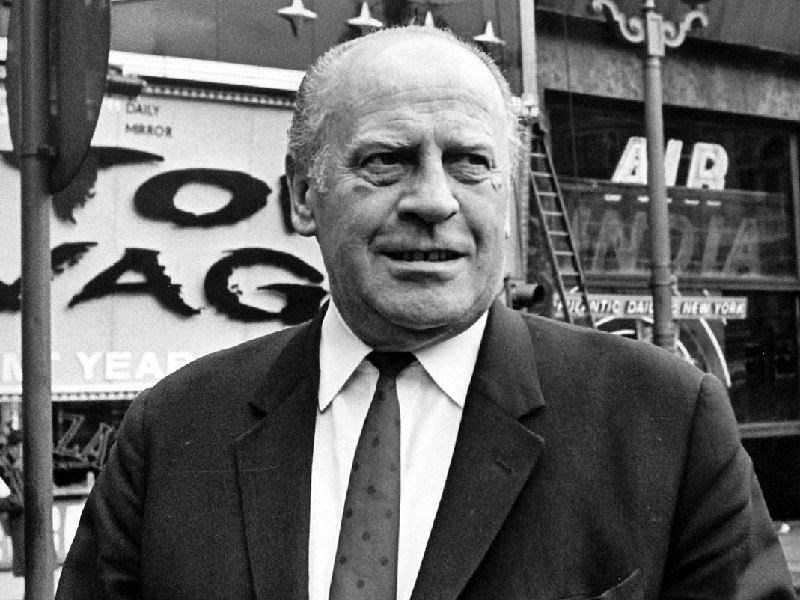 Oskar Schindler, 1967Holocaust Research Project
Oskar Schindler, 1967Holocaust Research Project
Works Cited
Spielberg, Steven, and Steven Zaillian. Schindler's List. Schindler's List (1993), Universal Pictures,
1993, www.imdb.com/title/tt0108052/.
Stern, Isaak, et al. “Schindlerjuden Letter.” Received by Oskar Schindler, A Letter Written by the Schindler Jews, 8 May
Page created on 5/29/2018 4:38:47 AM
Last edited 5/31/2018 4:50:49 PM
